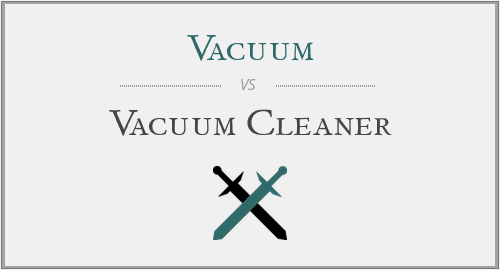Vacuum vs. Vacuum Cleaner
Those who know the meaning of the phrase “vacuum cleaner”, may naturally assume that “vacuum” is just a shorter version, referring to the same cleaning device. But actually, it’s this meaning, and more. Using “vacuum” instead of “vacuum cleaner” has become the norm and accepted speech nowadays, so they can be used as synonyms. They refer to the same concept of cleaning only when “vacuum” is used as a verb. As a noun, “vacuum” carries two other different definitions which we are going to discuss in the following paragraphs.
What you should take note from this section is the fact that “vacuum cleaner” is always used as a noun, referring to the cleaning device, whereas the word “vacuum” can be used as both a noun and as a verb.
When do we use “vacuum”?
As already explained above, we can use “vacuum” both as a verb and as a noun. As a verb, things are pretty simple, and “vacuum cleaner” is the best clue for its meaning. The action “to vacuum” refers to the action of cleaning a place using the technology of a vacuum cleaner.
As a noun, the primary meaning of the word “vacuum” is a space containing no air or any other type of gas in it. It is a physical phenomenon and concept. Secondly, “vacuum” describes a feeling of emptiness or a feeling of unhappiness that someone experiences when a beloved person leaves them, or is no more. In both cases, the noun has no connection to what a “vacuum cleaner” functions as.
Find some examples below, illustrating all these meanings in appropriate contexts:
Example 1: We need to vacuum this room immediately so we make sure no glass fragments are left from the broken glass. – as a verb, “vacuum” defines the action of cleaning the room using a vacuum cleaner.
Example 2: I’m not surprised they were suffocating with no oxygen left, the room practically became a vacuum. – as a noun, the primary meaning of “vacuum” is a space without air or other gas.

Example 3: A huge vacuum was left in his life after his wife passed away. – secondly, “vacuum” can also define the empty place and unhappiness left by the death or departure of a beloved person.
When do we use “vacuum cleaner”?
With “vacuum cleaner”, things are a lot clearer and easier to remember/understand. As we all probably know, the word structure is always used as a noun, and defines the electric machine that is used to clean floors, carpets and other surfaces by sucking up all the dirt. In UK English, a “vacuum cleaner” is also known as a “hoover”.
Example: Take that vacuum cleaner and make sure all the dirt in this room is cleaned before the guests arrive. – a “vacuum cleaner” is a cleaning device that sucks up dirt from the floors; it’s a perfect synonym for the UK “hoover”.
Conclusion
A “vacuum cleaner” is a cleaning device, whereas “vacuum” is either a place with no air or gas, or a feeling of unhappiness that one gets after a beloved person leaves or passes away.
The only common point between “vacuum” and “vacuum cleaner” is when “vacuum” is used as a verb, as it defines the action of cleaning using a vacuum cleaner. Now you’re a pro at these two words and their usages!








Have a discussion about this article with the community:
Report Comment
We're doing our best to make sure our content is useful, accurate and safe.
If by any chance you spot an inappropriate comment while navigating through our website please use this form to let us know, and we'll take care of it shortly.
Attachment
You need to be logged in to favorite.
Log In